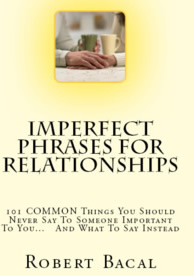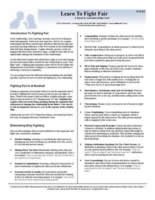All Couples Should Learn To FIght Fair. Here's How
Check out our mini-guide on how to fight fair, and stop letting badly handled conflict cause pain in your relationships. Download it NOW!
Search Our Network Of Business and Personal Development Sites
Learn to control your anger tips
How to Control Your Anger: Retreat and Think Things Over By Dr. Tony Fiore
Summary: Sometimes it's simply not possible to regain control over your anger in the moment. And if you can't control your anger during conflicts, you will cause (yourself and others) pain, and run the risk of permanently damaging relationships. Learn some anger control techniques in this article.
Jim and Mary Jones loved each other deeply, but often went into horrific verbal battles over any number of issues. They would argue and yell for hours, often into the night, leaving both of them exhausted, emotionally disconnected, hurt and resentful toward each other.
Both became so upset they were flooded with negative feelings which prevented their being able to repair the damage, to think rationally, or to problem-solve the issues at hand.
Much of this emotional suffering could have been prevented or least minimized had they learned anger control tool #8:
—“Retreat and Think Things Over.”
Basically this means to temporarily distance yourself from the situation for a period of time so that both of you can calm down. This allows your bodily systems to return to normal, and allows your normally good reasoning and thinking ability to return.
Easier Said Than Done
Yes, it is much easier said than done. It is one of those tools that sounds deceptively simple, yet it is by no means easy to do for at least two reasons:
There is a common myth that all relationship conflicts should be “settled” in the moment while the intense feelings are present. If you do not do this, you may be accused of “avoiding” the issue.
Once stress or anger levels escalate to a certain point, one or both partners reach a point of no-return, due to flooding of the brain with intense emotions. This makes it almost impossible to disengage from each other and stop the fight.
Heed these Warning Signs
You know it is time to Retreat and Think Things Over when you are:
• Feeling overwhelmed during an argument
• Raising your voice to an unusual level
• Feeling your temper is out of control
• You notice your heart racing
• Sense your muscles tensing
• Can’t think straight and you start to feel hostile.
Why this tool works
Temporarily removing yourself from the situation allows your body to return to normal, provides a cooling-down time. It also allows your brain to return to its normal state where you can reason and think better.
This tool helps prevents you or your partner from saying unfair or hurtful things in the heat of battle—which can easily escalate into further conflicts and resentments, causing you and your partner to become even more emotionally cut-off and distanced from each other.
Some Basic Rules
While the concept of “Retreat and Think Things Over” is simple, it will not work very well unless the following rules are followed:
Rule #1: You can only use the tool for yourself - not your partner. It does not usually work for you to tell your partner it is time for them to retreat.
Rule #2: Announce that you need to take a time out and Retreat before you do it. This should be done using assertive communication in a way that clearly conveys your need to leave before thing get out of hand, as opposed to your leaving to merely avoid dealing with the situation.
Rule #3- You need to commit to a reasonable length of time to return and deal with the issue— no longer than several hours, as a general rule.
Rule #4: Don’t drink or use drugs to get high during this time. It will be much harder, if not impossible, to convince your partner of your sincerity in wanting to work things out if you return intoxicated or high.
Rule #5: Be very careful and very selective in who you talk to during your Retreat Time. While there is a natural tendency to contact a friend or family member who is sympathetic, you should be careful.
Why is this important? Because they may have a permanently negative view of your partner, even after you have made-up and things are now fixed in the relationship.You can’t necessarily expect your family to turn the positive emotions back on like you have.
Temporarily removing yourself from the situation allows your body and mind to return to normal, allowing your normally good reasoning to return.
Dr. Tony Fiore is a So. California licensed psychologist, and anger management trainer. His company, The Anger Coach, provides anger and stress management programs, training and products to individuals, couples, and the workplace. Sign up for his free monthly newsletter "Taming The Anger Bee" at http://www.angercoach.com and receive two bonus reports.
Article Source: http://EzineArticles.com/
 Manage Conflict - Resolve Conflict - Prevent Conflict
Manage Conflict - Resolve Conflict - Prevent Conflict 

